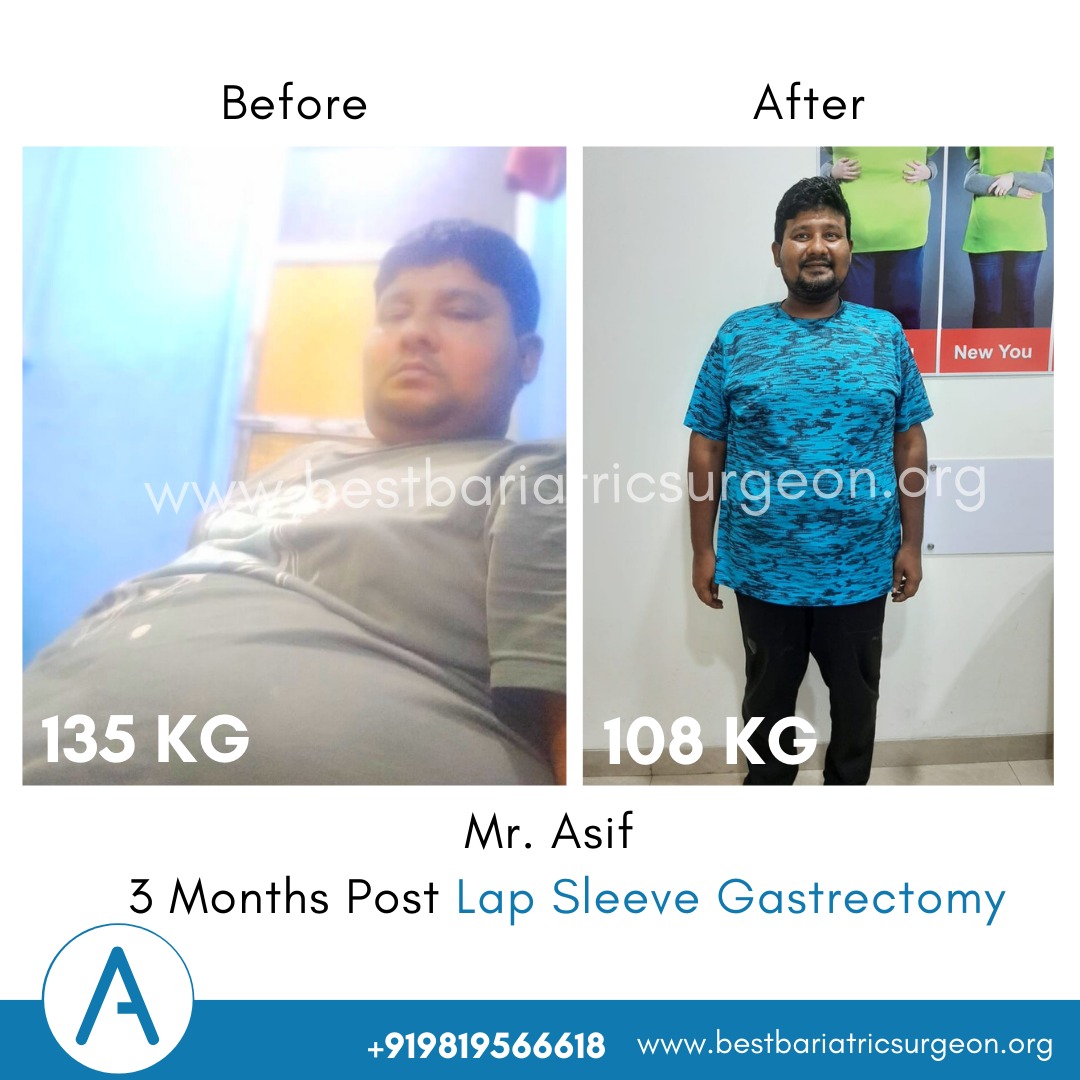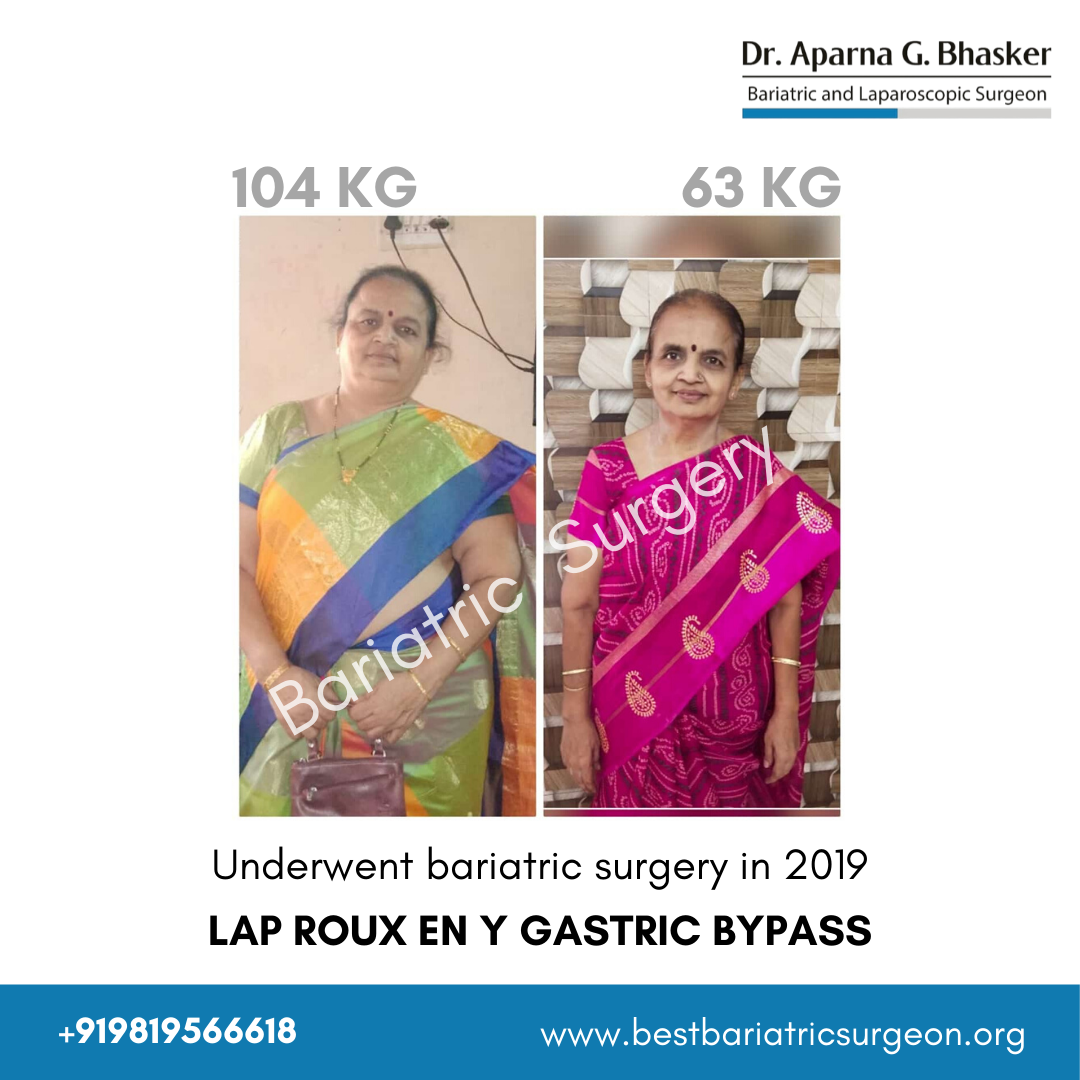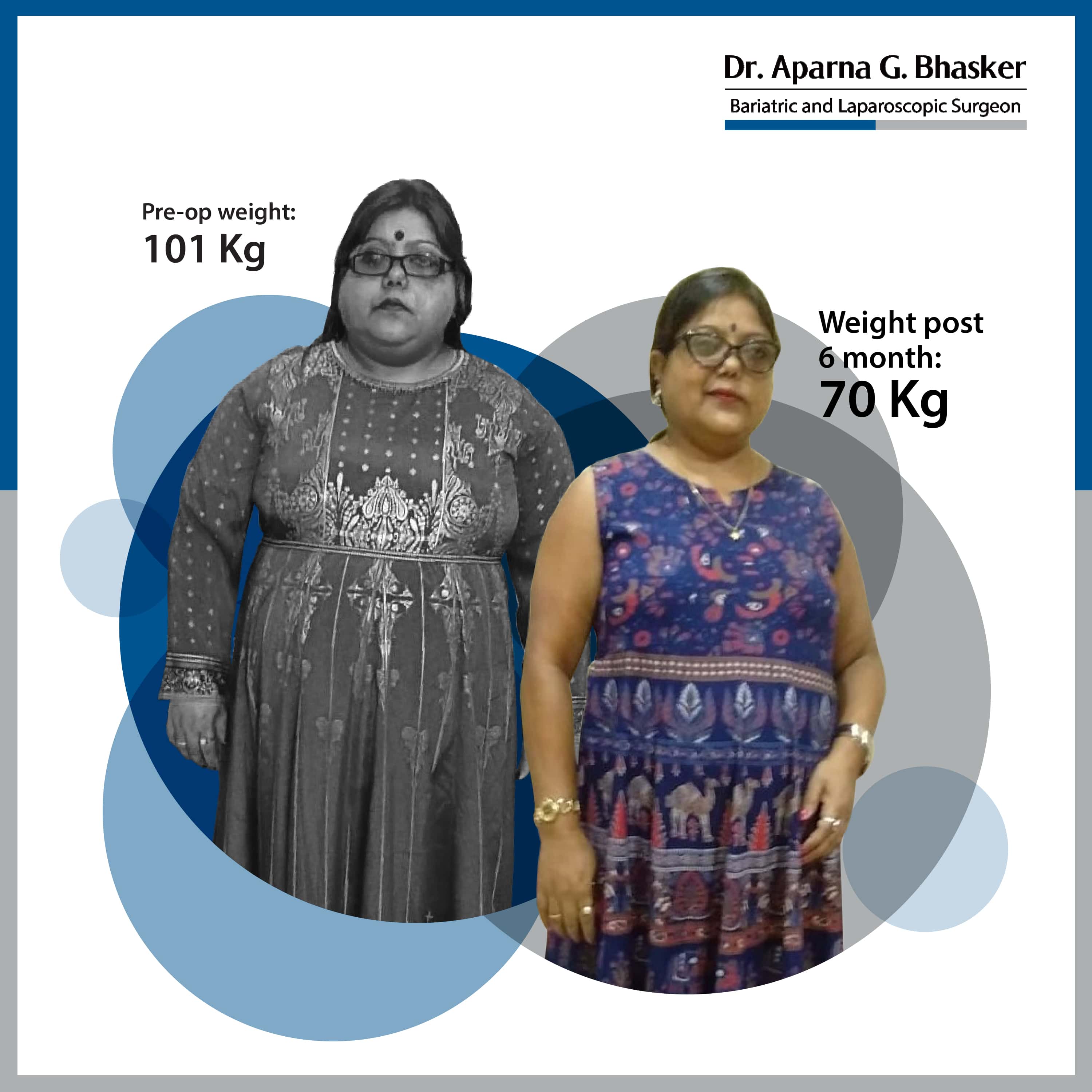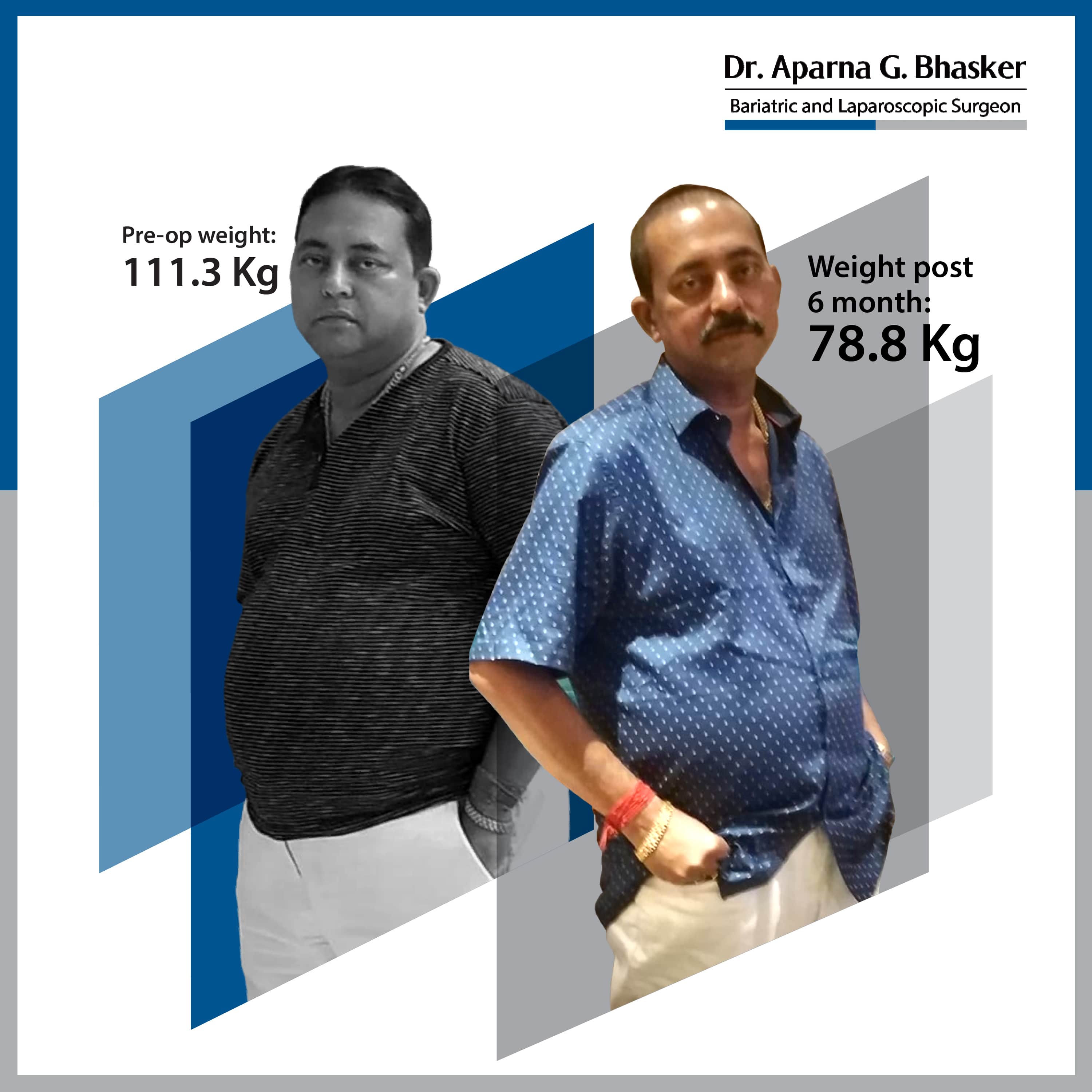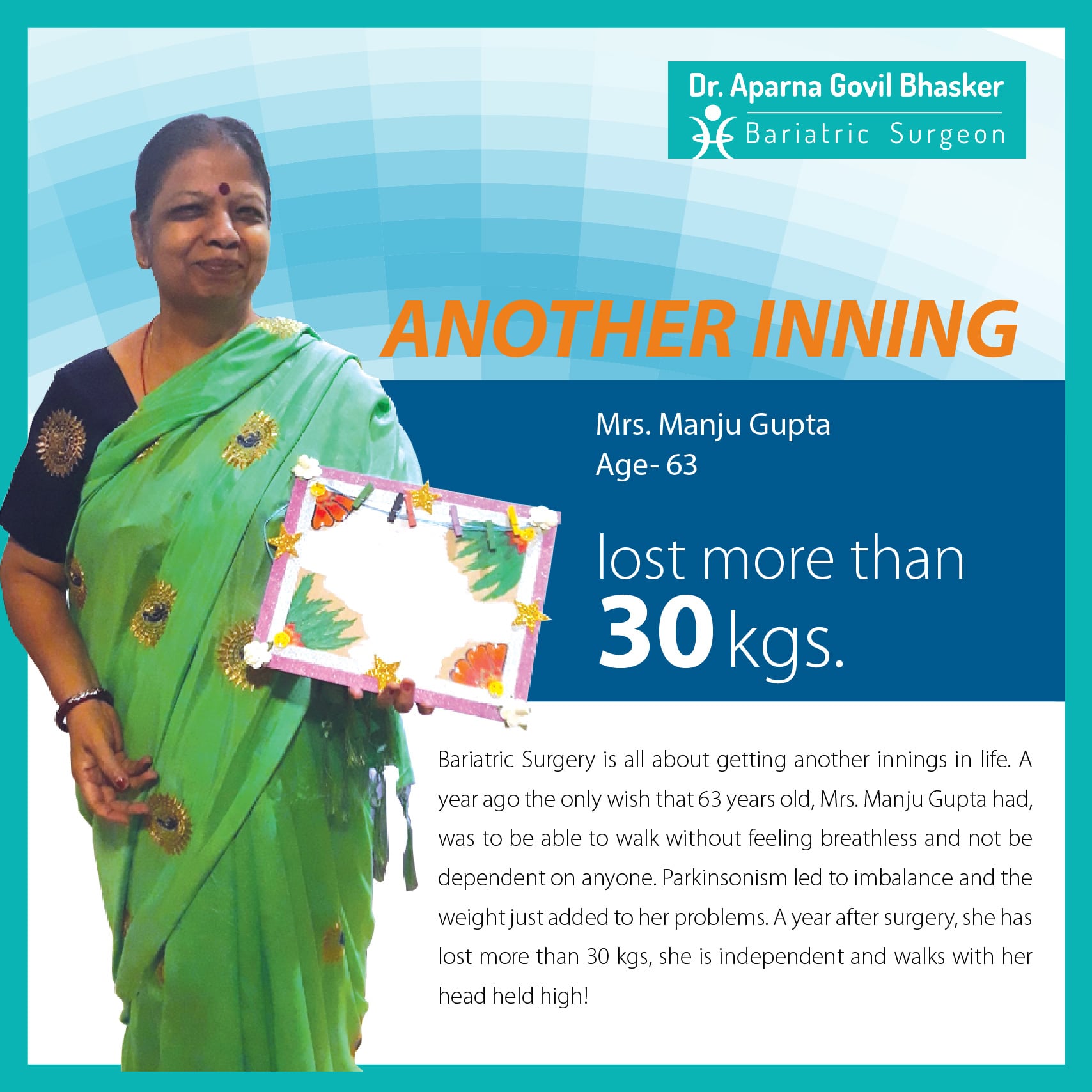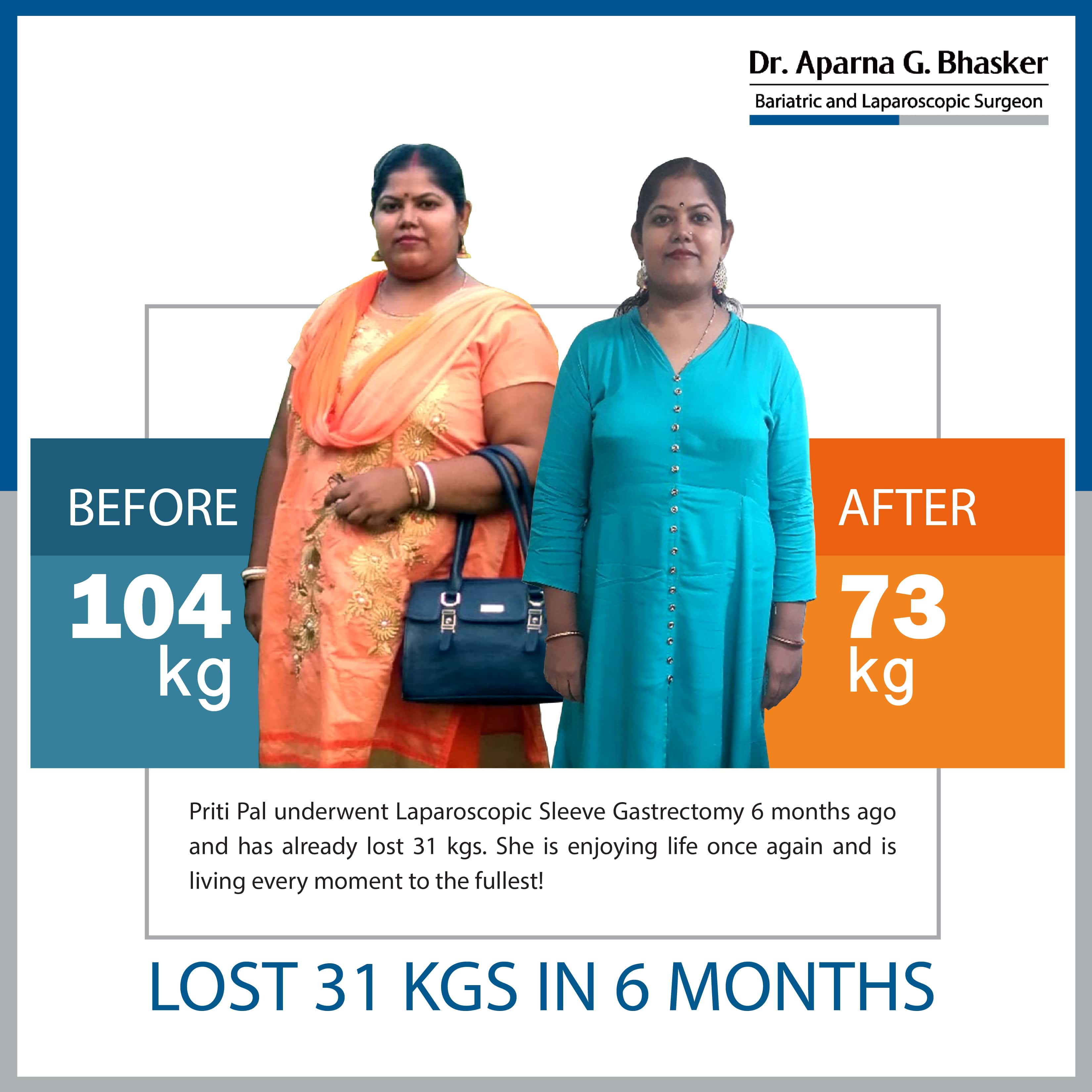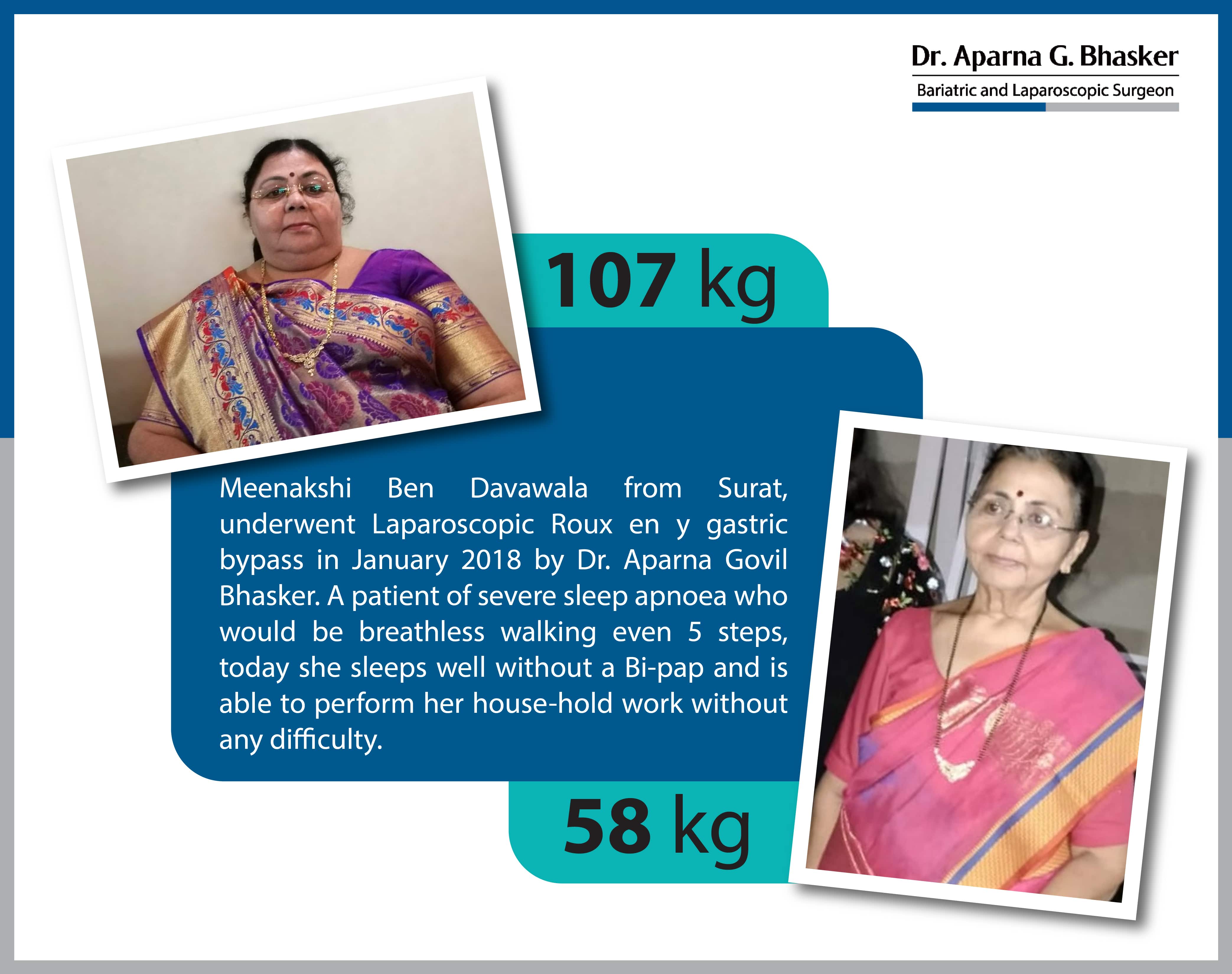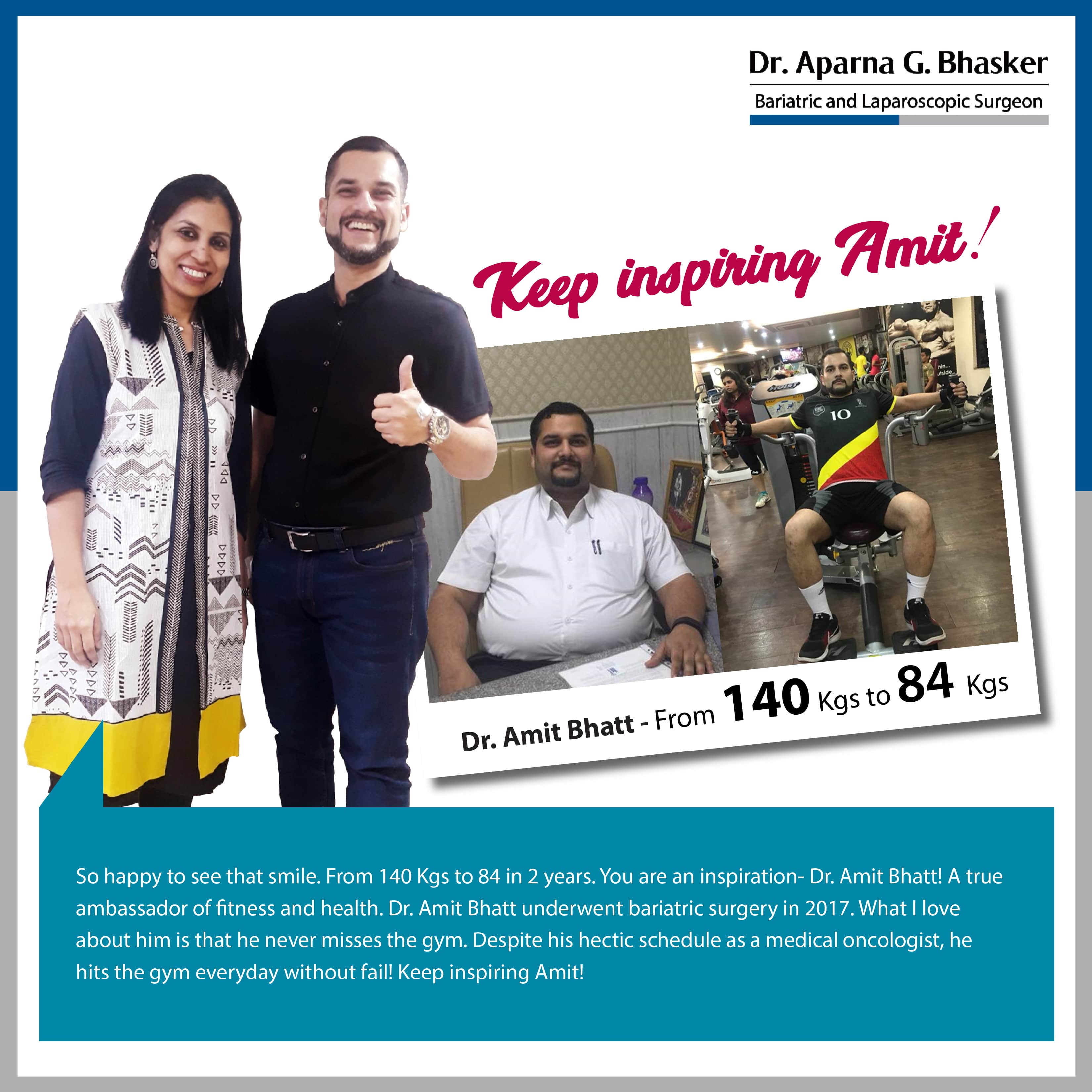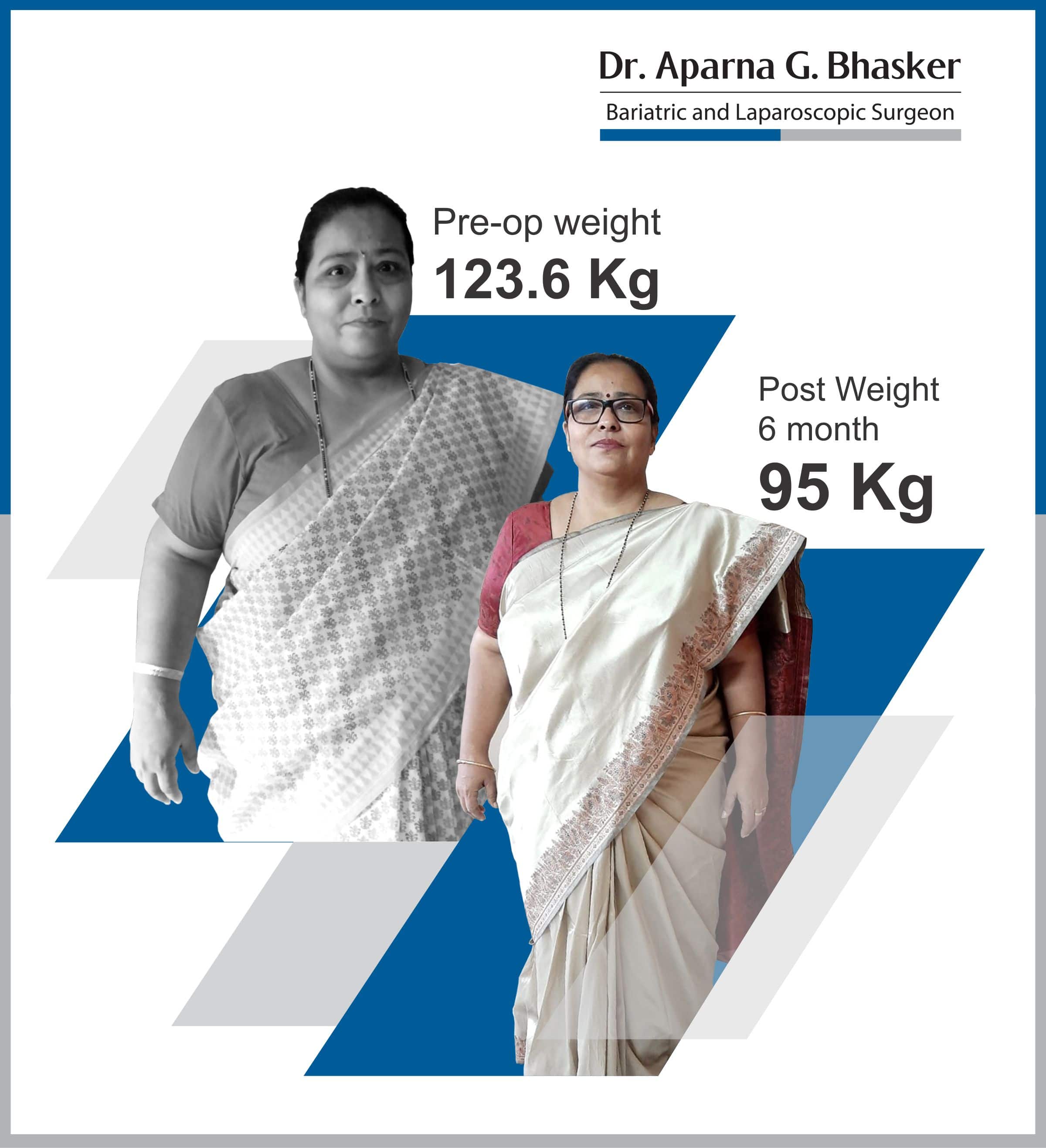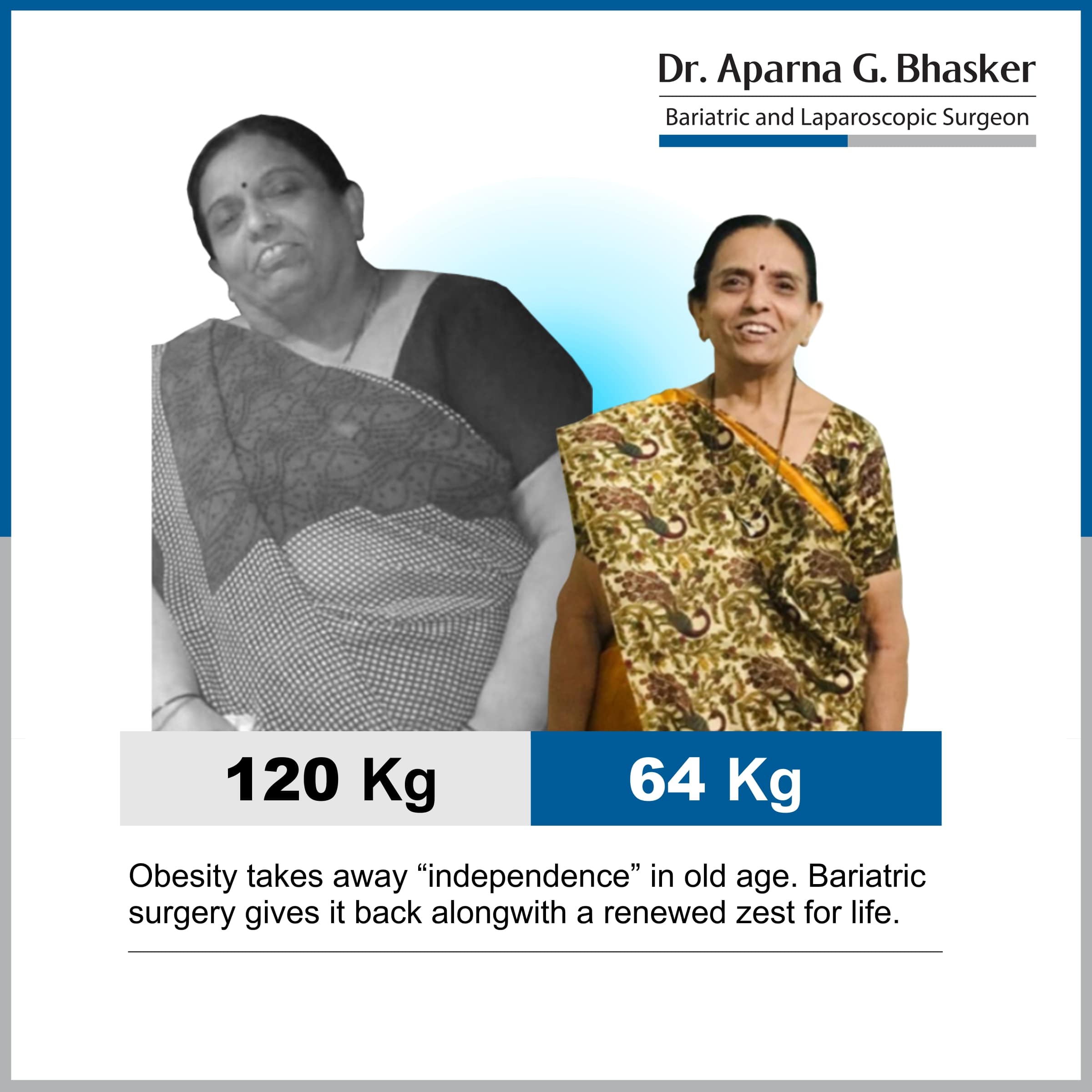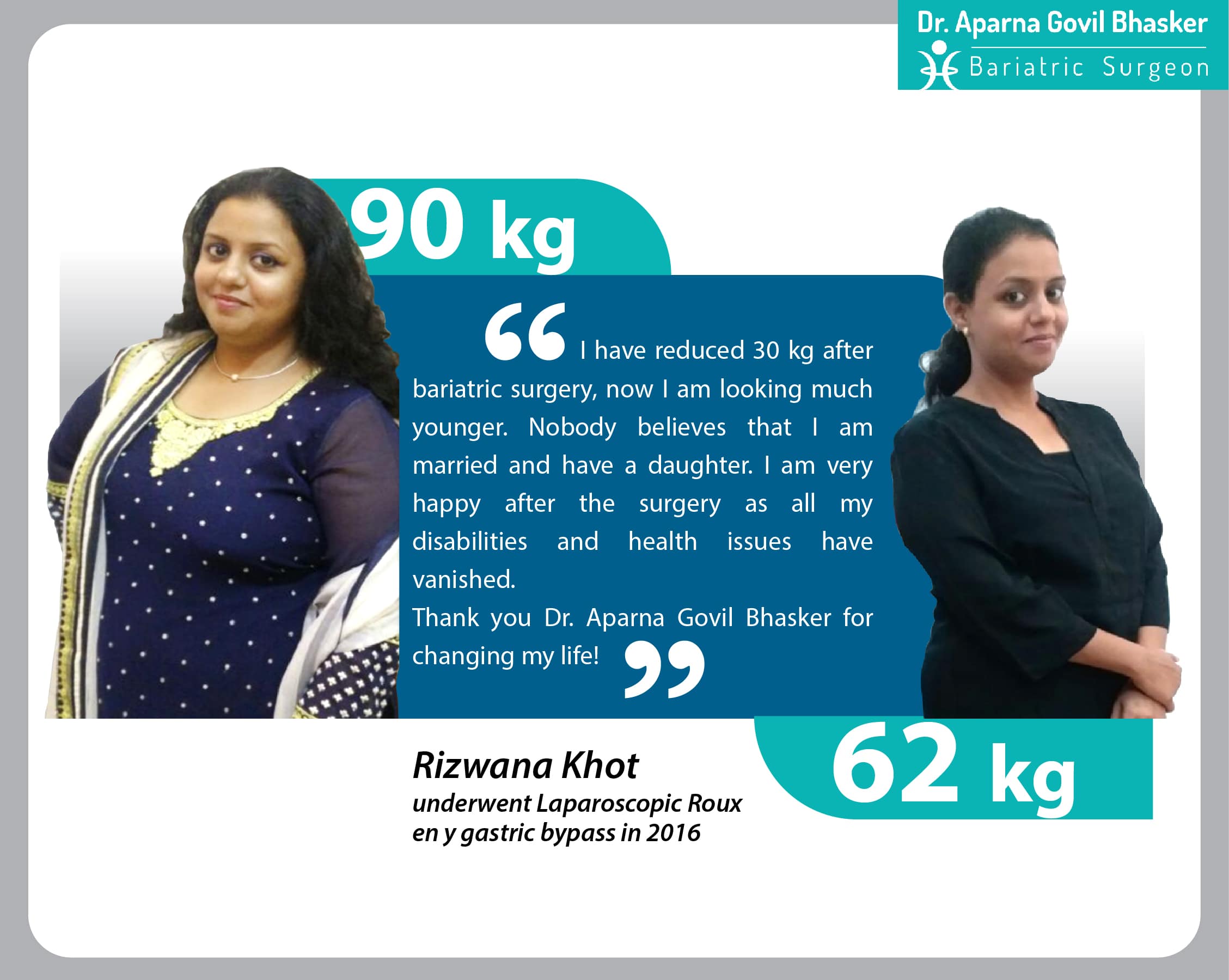
Laparoscopic Mini Gastric Bypass Surgery in Mumbai/Omega Loop Bypass
- Home
- Laparoscopic Mini Gastric Bypass Surgery in Mumbai/Omega Loop Bypass
Laparoscopic Mini Gastric Bypass Surgery in Mumbai/Omega Loop Bypass
Laparoscopic Mini Gastric Bypass in Mumbai(Single Anastomosis Gastric Bypass)
Laparoscopic mini gastric bypass is a newer bariatric procedure but has gained popularity very rapidly across India. It is being performed very frequently by many surgeons. As compared to a laparoscopic Roux-en y gastric bypass it is a technically easier procedure. Weight loss outcomes and improvement in co-morbidities is almost the same as any other standard bariatric procedure.
What is Laparoscopic mini gastric bypass surgery?
Laparoscopic min gastric bypass is a surgical procedure in which a long vertical pouch of the stomach is created using staplers and a loop of small intestine is joined to this stomach pouch. Major part of the stomach, duodenum- which is the first part of small intestine and about 150 to 200 cm of jejunum is bypassed in this surgery. When food is consumed, it comes via the food pipe into the stomach pouch and directly enters the small intestine.
Mechanism of weight loss after laparoscopic mini gastric bypass
Mini gastric bypass leads to weight loss by a combination of multiple mechanisms. First of all, as the stomach pouch is narrow, you will not be able to eat too much initially and your intake will be restricted. Secondly, you will feel full even after eating small quantities and will feel satiated much earlier. Thirdly, “ghrelin” the hunger inducing hormone which is produced from the fundus of the stomach, does not come in contact with the food and hence the sensation of hunger is curbed to a large extent. Fourthly, as the stomach and first part of intestine are bypassed, a mini gastric bypass also leads to a fair degree of mal-absorption. In addition to this there are GI hormones that play a big role in weight loss as well as control of diabetes. There are also other factors like bile acids, gut microbiota and certain unknown factors that augment the effect of a laparoscopic mini gastric bypass.
Food intake goes up gradually and patients are able to consume much more quantities than what they can after a Roux-en Y gastric bypass and the weight loss is maintained mainly due to mal-absorption in the long term.
Scarless- mini gastric bypass
Conventionally a mini gastric bypass is performed by making 5 tiny cuts on your tummy. Most of these cuts are less than half a cm in size and the largest is about 1 cm. These cuts are stitched with absorbable sutures and normally there is no need to remove the stitches later on.
Yes, a mini gastric bypass can be performed in a “scarless” way for selected patients. In this method, a 2 cm cut is created in the navel and major part of the surgery is done through this cut. Once this cut is stitched and it heals, it practically leaves no scar on the abdomen. This is called as the “scarless” or “single incision” mini gastric bypass.
Main advantages of a “scarless”/ “single incision”, mini gastric bypass are cosmetic as it leaves no tell-tale signs of surgery. Most of these patients also have lesser pain as compared to patients who undergo a 5 incision laparoscopic mini gastric bypass.
Expected weight loss after a laparoscopic mini gastric bypass
Weight loss is a gradual process after a laparoscopic mini gastric bypass. You will lose weight quite fast in the first 3 to 4 months after which, weight loss slows down. You will continue to lose weight for about 12 to 18 months after your surgery and can expect to lose about 70 – 80% of your excess weight with help of a laparoscopic mini gastric bypass.
It is important to note that bariatric/metabolic surgery is a tool that pushes you into a lifestyle change. While bariatric/metabolic surgery helps to lose massive amount of weight, it is also important to exercise every day and follow a healthy diet. Our experience shows that patients who embrace the lifestyle change along-with surgery, tend to do much better in terms of weight loss and weight maintenance.
Diabetes improvement after a laparoscopic mini gastric bypass surgery?
Mini gastric bypass surgery leads to a significant improvement in type 2 diabetes. It has been observed that a lot of patients do not need to go back on their anti-diabetic medications after the surgery. For those who need to continue medications, the dose is reduced considerably and a lot of times patients who have been on insulin may not require it post-operatively. The outcomes of diabetes remission depend on a lot of factors like the duration of diabetes, type of diabetes (type 1/type 2), age of the patient, c-peptide levels, use of insulin etc. It also leads to improvement in other associated diseases like high blood pressure, high cholesterol, obstructive sleep apnoea, gout, joint diseases, PCOD, infertility etc. The overall risk for heart disease goes down considerably due to significant weight loss and overall improvement in associated co-morbidities.
Cost of a mini gastric bypass surgery
Like other bariatric/metabolic surgeries, this surgery also requires a lot of disposable equipment in the forms of stapler guns, trocars, cartridges, energy sources etc. This increases the cost of laparoscopic mini gastric bypass surgery. Laparoscopic mini gastric bypass surgery cost also depends on the number of days you need to stay in the hospital, type of room that you select as well as the hospital in which you get operated. We will guide you about the cost of mini gastric bypass surgery after assessing and evaluating all the above details.
Single anastomosis gastric bypass (Mini gastric bypass) FAQs
-
What kind of preparation is needed before a laparoscopic mini gastric bypass surgery?
Once you see the doctor, you will need to undergo investigations and medical checks for fitness. Additionally, you may need to see a chest physician, an endocrinologist, a nephrologist or a cardiologist, based on your clinical profile. You will also need to be on a high protein liquid diet for about 5 to 7 days prior to surgery. We would want you to lose atleast 3 to 5 kg before you undergo any bariatric/metabolic surgery. This also helps to reduce the swelling on the liver, and makes surgery easier for the surgeon and in turn, safer for you. In a way, it is also a test of your compliance for long term follow up. It has been seen that patients who follow the pre-operative diet well, they tend to get better results after any bariatric/metabolic surgery.
-
How long does the surgical procedure take?
You will be admitted to the hospital one day before the surgery or in special cases as per the advice of the doctor. The surgery typically takes about 60 to 90 minutes to perform depending on the grade of difficulty. You are encouraged to walk within 4 to 6 hours of surgery. Most patients get discharged the next day, of course it will depend on your clinical condition and the doctor’s decision.
-
What kind of follow up is necessary after a laparoscopic mini gastric bypass surgery?
Follow up is the most important part of any bariatric/metabolic surgery. You will need to see Best Bariatric Surgeon in Mumbai Dr. Aparna Govil Bhasker 7 days after your surgery. After this in the first year, you need to do your tests and visit at 3 months, 6 months and at the end of 1 year. Post 1 year, all patients need to get investigated once a year and visit the centre for a check up. Life long follow up is advised after all bariatric/metabolic surgeries.
-
What kind of dietary changes will I have to follow after a laparoscopic mini gastric bypass surgery?
After the laparoscopic mini gastric bypass surgery, you will be on liquid diet for 15 days followed by soft diet for 15 days. You can commence normal home food after a month of surgery but it will be restricted in quantity. The nutritionists will guide you at every step and will be there to answer all your queries. You will need to avoid high calorie foods, fired food, sweets and alcohol. High sweet intake can lead to dumping syndrome after a laparoscopic mini gastric bypass surgery.
-
Will I be on medications after a laparoscopic mini gastric bypass. If yes, for how long?
After any bariatric/metabolic surgery, you need to be on nutritional supplements. There are two reasons for that. Firstly, your intake will reduce considerably and secondly after a laparoscopic mini gastric bypass you will not absorb certain nutrients due to its higher mal-absorptive component. It is important to take protein supplementation also regularly as you will not absorb adequate dietary proteins. You may also need to be on other medications as advised by the doctor based on your clinical profile.
-
What are the side effects of a laparoscopic mini gastric bypass surgery?
Laparoscopic mini gastric bypass surgery is as safe as any other bariatric/metabolic surgery. However, there is a greater chance of developing nutritional deficiencies and sometimes troublesome diarrhoea after this procedure. The doctor will explain the side effects of this surgery to you in detail during consultation.
-
Is one allowed to smoke after a mini gastric bypass surgery?
Smoking is a contra-indication for any bariatric surgery. If you are a smoker, you need to give up smoking completely atleast 15 days prior to undergoing surgery. If you are not confident about being able to stop smoking altogether, then our advice is that you must not undergo bariatric surgery, in order to avoid serious complications in future.
-
Can one regain weight after a laparoscopic mini gastric bypass surgery?
Long term weight maintenance depends on a host of factors. Some degree of weight regain can happen after any bariatric procedure. Therefore, it is imperative to exercise and bear moderation in diet after the surgery.
-
Are there any problems in the long term after this surgery?
There are reports of bile reflux in the stomach pouch in the long term after this surgery. Presently we do not have enough evidence to know if this bile reflux can cause any potential harm to the stomach pouch or the food pipe in future. There is also a higher incidence of iron deficiency anemia after this surgery as compared to other bariatric procedures.
Laparoscopic Mini Gastric Bypass Surgery Patients Before After Photos
Laparoscopic Mini Gastric Bypass Surgery Patient LIVE VIDEO Testimonials
About Dr. Aparna Govil Bhasker
Dr. Aparna Govil Bhasker is an accomplished Bariatric Surgeon and Laparoscopic GI Surgeon. Extremely passionate about her field of specialization. She completed her MBBS and MS in General Surgery in 2006, from Mahatma Gandhi Institute of Medical Sciences (MGIMS), Sewagram. Set up in 1967 by none other than the first health minister of India, Ms. Sushila Nayar, MGIMS is deeply rooted in Gandhian ethics. Read more


Surgeon in India


Bariatric Surgery: Pros and Cons
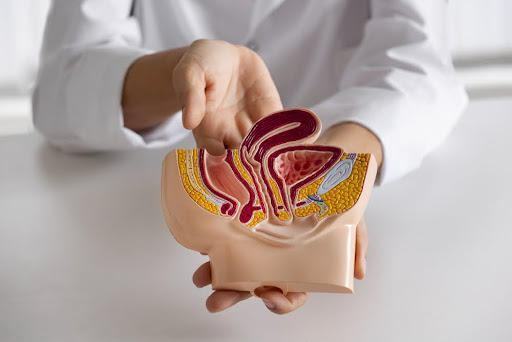
Types of Hernias and Their Treatment Options Explained
- Intra-Gastric Balloon Insertion Surgery
- Laparoscopic Adjustable Gastric Banding Surgery
- Gastric Sleeve Surgery / Laparoscopic Sleeve Gastrectomy
- Single Incision Sleeve Gastrectomy Surgery
- Laparoscopic Roux-en Y Gastric Bypass Surgery
- Laparoscopic Banded Roux-en Y Gastric Bypass Surgery
- Laparoscopic Mini Gastric Bypass Surgery /Omega Loop Bypass
- Laparoscopic Sleeve Gastrectomy with Duodeno-Jejunostomy Surgery
- Laparoscopic Duodenal Switch Surgery
- Laparoscopic Sleeve Gastrectomy with Duodenal Ileostomy (SADI) Surgery
- Laparoscopic Revisional/Redo Bariatric Surgery
- Metabolic Surgery for Diabetes
- Terms & Conditions
- Privacy Policy
- Sitemap

